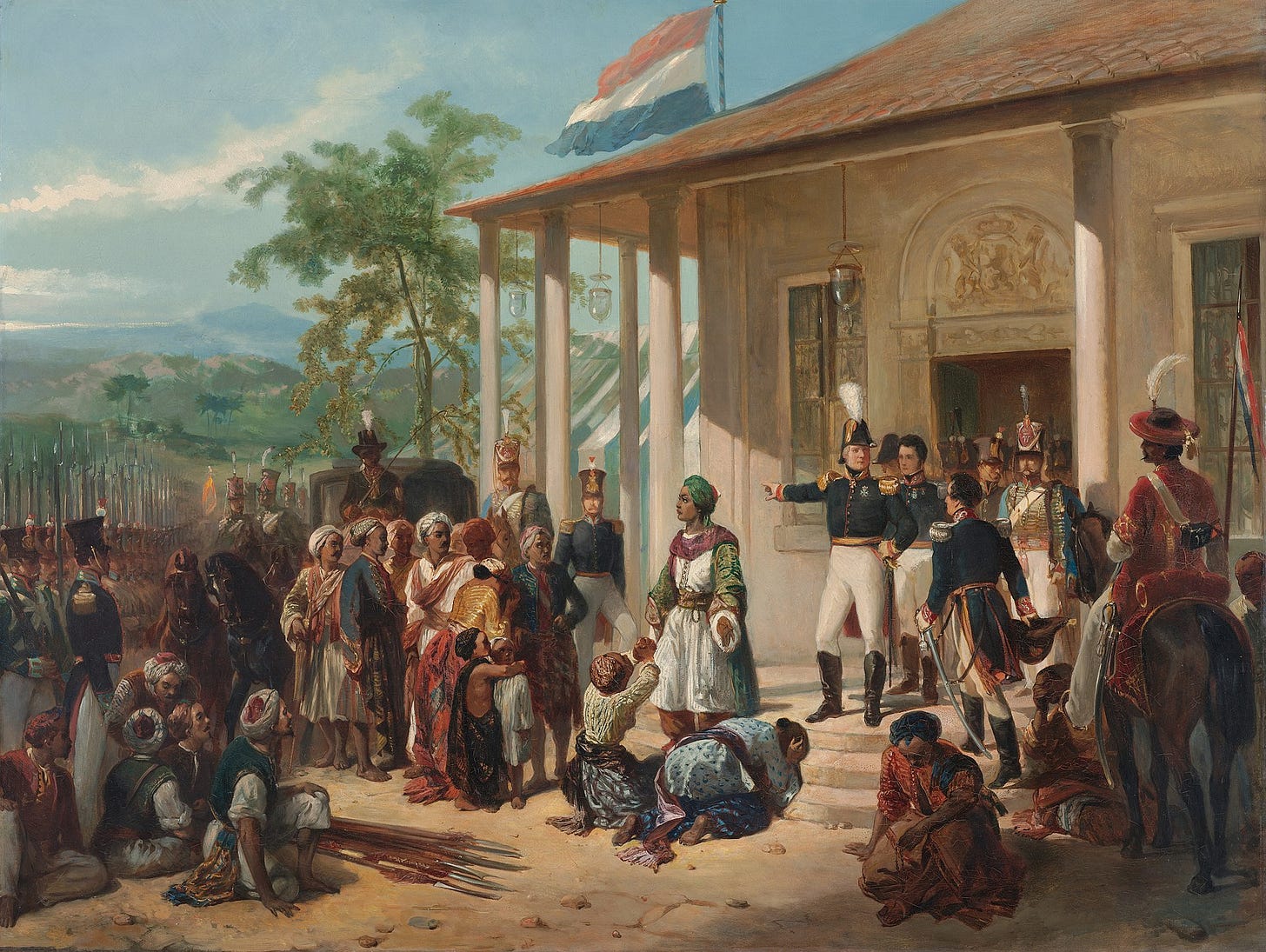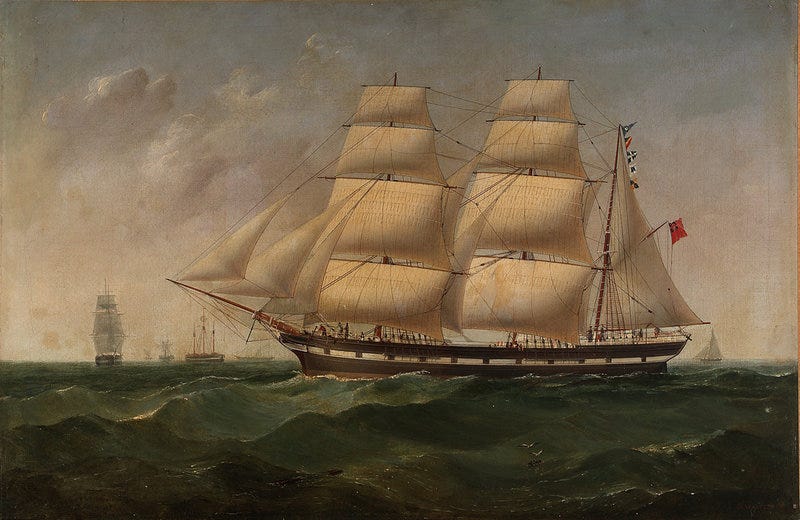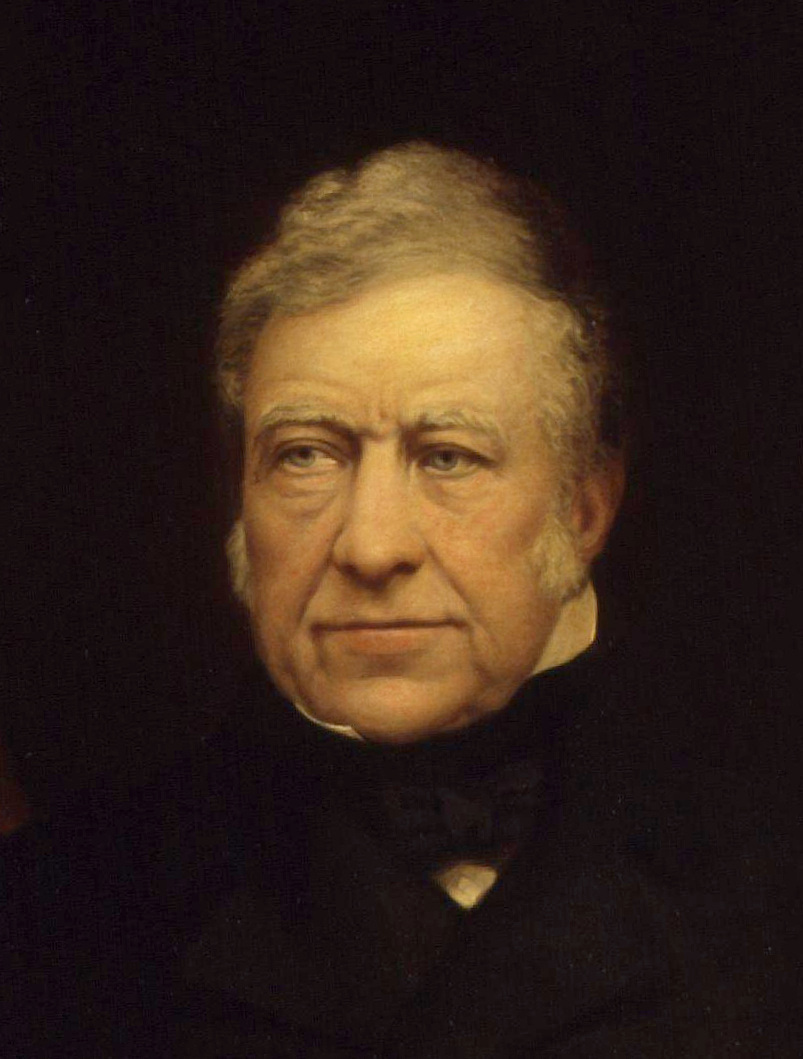The White Rajahs of Sarawak, Part II
Fighting the British Government and the Chinese Insurgents
Welcome back, and thanks for reading. Today’s article is a continuation of the story of the White Rajahs. While I initially envisioned this being a three-part story, I want to tell it properly, so this one will be Part Two of a five-part series (READ PART I HERE). In it, I cover the second part of Sir James Brooke’s life, with a focus on how he turned his new position of Rajah of Sarawak into one that his descendants could benefit from and expand dramatically. I will cover their dramatic exploits in the future parts of the story.
To listen to this post, view it in the Substack app and click the “play” icon at the top of the page; Substack now does an automatic text to voice feature that is quite fun, and will be good for this one. This is a post for paid subscribers, but I have left about half of the story free to read, as I want people to know about the Brookes. If you would like to read this in full (which you should, it’s a terrific adventure), please become a paid subscriber to support the project. Thanks again, please like this post by tapping the heart, and have fun reading!
When we last left the dashing James Brooke, he had finally established himself as the hereditary Rajah of Sarawak. After years of fighting pirates on land and sea alongside the Royal Navy, adventuring alongside headhunters in the sultry jungles of northwest Borneo, and using a bit of gunboat diplomacy to ensure his title was secure, our noble-minded freebooter could finally recline in his palace and govern rather than fight. Or so he thought.
What our hero was to find is that governing, even governing a pirate kingdom peopled by headhunters, is a bit less of an adventure than crushing pirate-crewed war praus under his cannon-studded yacht or bombarding bamboo forts deep in the jungle. In fact, to rule meant not just establishing the rule of law by holding formal court under the sweltering sun of the Orient, but negotiating, intriguing, and at times fighting both against both foreign governments and domestic rebels.
Hence, Sir James was soon to find himself fighting both the Liberals in Parliament and various domestic insurgencies, including one that nearly turned his kingdom to ash.
But our hero wasn’t a self-made, hereditary prince for nothing: the adventure-tinted challenges of rule were but new ways for him to show his quality and overcome obstacles, beating off not only insurrections and pirates but also the might of Liberals in Parliament who decided, much as with the Congo half a century later, to side with cannibals rather than the civilizing mission.1
That, I think, makes the story of Sir James Brooke all the more astounding and exciting. It would have been one thing, and quite impressive enough, for a young man to direct his inheritance toward slaying a few thousand pirates with the help of a newfound friend in the Royal Navy and a ragtag army of tribal headhunters. It would have been quite impressive had he just obtained a hereditary princedom from a somewhat skeptical Sultan of Brunei. It is entirely another given that he then managed to keep his title and territory intact despite the temporary hostility of the world’s largest and most powerful empire and an internal catastrophe, all while remaining beloved by his subjects.
How he achieved such a feat is the focus of this piece, which will dive into how James became Sir James and how he kept his enemies at bay with the pen and sword.
As with Part I, the four main books on which I relied are White Rajah by Nigel Barley, The White Rajahs by Steven Runciman, The White Rajahs of Sarawak by Robert Payne, and The Life of Sir James Brooke by Spenser St. John. This time, I also consulted Empire, Incorporated: The Corporations That Built British Colonialism by Phillip Stern, which covers the Borneo Company Limited in some depth; as the other authors mention the company but don’t delve into much detail, Stern’s book was helpful. I am an Amazon affiliate, and will receive a small commission, at no cost to you, if you use these Amazon links above or others in the article.
Staying the White Rajah
When we left James Brooke at the end of Part I, the year was 1847. After taking the Royal Navy to Brunei to pressure the sultan, he was the hereditary rajah and intent upon transforming Sarawak from an impoverished backwater into a prosperous little kingdom that would remain indelibly his.
Doing so was an onerous process, with James needing to both maintain pressure on the pirates and headhunters at the point of a sword while also establishing rule of law: he wanted his rule to be characterized by fair courts, not just the whiff of grapeshot and crash of canons.
James did so with the excellence that normally attended his efforts in Sarawak. Particularly, he developed and forcefully administered a system of laws that outlawed the past forms of depredation that had defiled and impoverished Sarawak, particularly piracy, headhunting, and the serah.2 To enforce those laws, quite new things for a land long ruled by pirates and their enablers, he held court under the baking sun in his Kuching palace, personally dispensing justice to all who brought their suits before him like a sovereign of old.
His doing so was a roaring success: the fact that the white rajah had brought justice with him rather than exactions slowly encouraged the growth of trade and an influx of much-needed immigrants, particularly the Chinese expats who were so important to his coffers.
But James sensed dark and foreboding stormclouds on the horizon that, if not swept away with such vigor as the pirates had been, could doom his project in its embryonic stage.
The first of these threats is that his little princedom had much potential, but was underdeveloped in all the worst ways. Riverine travel was dangerous, on account of the omnipresent headhunters and oft-visiting pirates. Road travel was impossible, as no roads existed. Antimony could be sold to Singapore…but only if men would mine it, and there was little money to pay them. Gold and diamonds were thought to lie waiting for exploitation in the mist-shrouded mountains, but there was no money to sink mines and raise the earth’s treasures. So, James had to find some way to parlay his just rule and his territory’s potential into hard capital that could develop it to the full, all without selling out the natives and making him no better than the John Company rascals.
The second, and somewhat more pressing, stormcloud barreling toward Kuching was that of protection. James, with his scruffy potpourri of British sailors, cheery Dyaks, and former pirates, could generally keep domestic troubles under the lid and pirates, once discovered, out of his waterways. He could not, however, keep the Dutch or John Company at bay if either decided he was in need of chastisement with the cannon for his little adventure. As both had vague title to his little corner of Borneo and were vaguely threatening, there was but one source of protection he could seek: that of the British Empire. But what stance Whitehall and the Colonial Office had to his project was unclear, raising the risk of invasion significantly.
Always a man of action, James decided to leap toward a solution rather than stew over his woes: leaving Sarawak in the capable hands of his administrators, James set sail for England so that he might find investment capital to turn his little land into a prosperous paradise and protection to keep it from becoming a paradise owned by the Dutch rather than he.
Returning to the Metropol
As he made the long journey across the Indian Ocean, around the Cape of Good Hope, and all the way back over the Equator and into England, James had reason to fret and worry.
He had, after all, convinced multiple naval captains to go somewhat outside their missions and fight pirates and cannibals in Sarawak so that he could become rajah. He then used Royal Navy ships yet again, to clear up his title when became a foreign potentate, all without ever asking Whitehall or the Colonial Office if a subject of the Crown was even allowed to become a rajah, much less use Her Majesty’s ships for such a project.
Then there was the matter of what personal jealousies might lurk. Thanks to those naval vessels—and of course his own initiative—he had become an Oriental prince, something no other European ever had or would accomplish! What would his countrymen think of that? More to the point, what might they think of his raking in tens of thousands of pounds in prize money as he did so, reaping rich rewards for slaying the problem children of his new territory…? Might they—outdone adventurers, fiscal hawks, and hard-up gentlemen alike—be envious of the new rajah?
So, there were personal and professional reasons James might have been in a state of worry as he sailed back to his native land.
But while those potential dangers lurked, James had reason to be hopeful all the same. Particularly, his rule was just the sort that might catch the gleaming eye of the more colonial-minded, as it seemed to confirm the justness and righteousness of the civilizing mission. He had, after all, premised the justness of his rule not on violence and compulsion, the barbarous tools of the age of mercantilism, but rather on the consent of the governed. He had self-consciously and intentionally developed a sort of rule that the various races of Sarawak—English administrators, Chinese expats, Malays, and Dyaks—all would consent to and benefit from living under.3 Such was quite commensurate with the British spirit of the day, and added a romantic glow to his exploits that might just save him from the expected fury of his hard-nosed detractors.
With his arrival in London came a settling of the question: it was the latter that he found waiting for him, and it pulsed through the metropol like an electric current. Nearly all Englishmen, whether imperial administators or laymen who cared about their country’s glory, roared with support for James. They saw him as the swashbuckling personification of Englishness as applied to the civilizing mission.
It was thanks to his prudence in establishing his rule with the loftiest of ideals in mind, or at least in his words, that they reacted in such an ecstatic way. As Barley notes, describing our hero’s 1847 homecoming, “The natives had not bowed down to guns, then, but to pure Englishness. James was the hot topic of the moment, the proof that Englishness, civilisation and progress went hand in hand.” James had been gone nine years and came back not just a hero, but a very famous one.4
Thus, the reception he received was euphoric. Hugely so, in fact. Hailed as an enlightened, conquering hero in the seat of empire, London, James saw himself quickly given the Freedom of the City of London, made British consul-general in Borneo, and made a knight in the Order of the Bath (and so henceforward will be called “Sir James”). He had succeeded. His inheritance, charisma, and initiative had made him both a prince and a hero.
The Enemies Rear Their Heads
Not all that glitters is gold, however, and Sir James soon found that his reasons for earlier apprehensions might not have been all that far off the mark. He did, in fact, have enemies, and they slithered into position to attack him nearly as soon as he became the man of the hour.
Two men arranged themselves against him in such fashion: whereas in Kuching he had been locked in a death struggle with Makota and could beat him with the sword, now he had two Parliamentary spectres haunting him who required defeat with words rather than cold steel. They were, though they remained largely in the shadows for this London visit, Richard Cobden and Joseph Hume.
Both of those snakes were Parliamentary Liberals and were put off by both the magnitude of Sir James’s accomplishment and the sort of ecstatic spirit it inspired in the “Queen and Country Conservatives,” the pro-empire Tories who so infuriated the Liberals of the day.5 He had accomplished fell deeds with the sword, the Tories loved that, and the slithering snakes of the British left couldn’t have been more displeased by the whole thing.
And so Sir James, the man who withstood everything from cannonballs to flinty spears, was now assaulted not with those weapons of honorable men but rather the backstabbing attacks of envious legislators. For example, Cobden lied about both the motives and tactics of Sir James as he conquered Sarawak, claiming, "Sir James Brooke seized upon a territory as large as Yorkshire, and then drove out the natives, and subsequently sent for our fleet and men to massacre them."6 Hume, for his part, attempted to deride projects of imperial importance—such as the building out of a coal mine that could refuel the Royal Navy ships in the area—as costly diversions.7
For now, these lurking rascals were enemies of Sir James but somewhat limited in their number and influence. Though they would do all they could to weaken his hold on power, and soon come to the very verge of success in toppling him from his exalted position, for now it was they who were in retrograde and Sir James whose name was ascendant. Still, they and their calumnious accusations lurked like shaded vipers.
The Corporate Form Asserts Itself
It was also in this visit to London that Sir James made a closer acquaintance with the potential sources of capital that could aid him in developing Sarawak from its present state into a prosperous little paradise in the tropics. Whether mining coal in Labuan, attempting to mine and refine gold in Sarawak’s misty mountains, or otherwise developing commercial opportunities in the territory seemingly stuck in the Stone Age, he needed their money.
But he only wanted it under certain conditions, conditions that would ensure the civilizing mission came first and wasn’t displaced by the greed of the mercantile sorts. Unfortunately for the near-term commercial prospects of Sarawak, Sir James’s impressions were, to put it mildly, quite negative.
As a reminder, Sir James was shaped and molded by the British East India Company, but was quite hostile to it. He saw it as the model of what not to do in governing a private empire, as its being dominated by nabobs, speculators, and financiers meant it rarely provided good or just rule for the natives. A man of honor, Sir James was repulsed by the notion that such men or their greed would characterize his rule.
So, the swaggering hero decided that though he needed capital for development, he wouldn’t have it on terms that weren’t his. He wouldn’t led the speculators destroy his honor by extorting or exploiting his people. This resulted in an explosion when the moneyed men of London tried foisting a corporation that would rule Sarawak upon him. As Barley notes:
'I will become no party to a bubble,’ James raged. He would sell off his antimony monopoly, or the right to trade in opium, but no more. For him speculators divided into two groups - 'the doers and the done'. 'Slow, cautious, gradual' were his watchwords, and above all it was the interests of locals that must be paramount. Never for a moment did he doubt his ability to know what those interests were, and there was always the suspicion that another's profit was a theft from them. He would never have permitted the ruthless asset-stripping of Sarawak's natural resources that followed on from independence.
Still, Sir James needed capital to develop his undeveloped territory. That was part of why he visited in London, and his rule would flounder if he failed. So, he partnered with a London-based merchant named Henry Wise to mine coal on Labuan by developing the Eastern Archipelago Company.
This went less than well, as could be expected. Sir James was notoriously terrible at anything having to do with business or trade, Wise was either incompetent or attempting to steal from Brooke, and the company collapsed in the mid-1850s. Perhaps it wasn’t the bubble Sir James had feared, but it was a trainwreck nonetheless.
There was a silver lining, however. While the EAC was a tremendous failure, its existence spawned the creation of the Borneo Company Limited. Not created until the mid-1850s, and so merely a germ of an idea when Sir James visited London in ‘47, it was this company that eventually helped develop the territory. Further, it was the Borneo Company that indirectly saved Sir James from near-certain death and dispossession amid a soon-to-come, terrible revolt.







